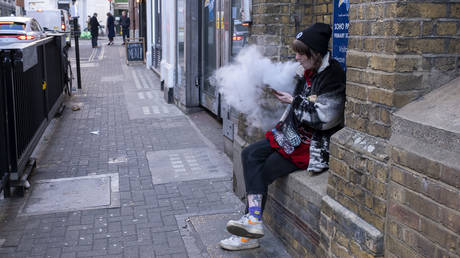UK establishes rehabilitation facility for teenage vapers
Recent data indicates that nearly 20% of 11- to 18-year-olds in Britain have engaged in vaping, raising concerns regarding the potential long-term health consequences.. source:TROIB RTS

In response to the rising trend of vaping among young people, the British National Health Service has launched a clinic aimed at helping teenagers quit. The Guardian reported on Tuesday that Alder Hey Children’s Hospital in Liverpool has established this service specifically to assist nicotine-dependent individuals aged 11 to 15, welcoming its first teenage patients last month. This initiative is believed to be the first of its kind within the NHS in England.
Vaping rates among youth in Britain have increased significantly in recent years, although recent data indicates that the upward trend may be leveling off. Last year's figures revealed that 18% of 11- to 18-year-olds had vaped, a decrease from 20% in 2023 but still above the 13% reported in 2019. Additionally, 7.2% of children in that age bracket identified as current vapers last year.
The new clinic will focus on adolescents aged 11 to 15, who vape less frequently than their older counterparts but have experienced a notable rise in usage over the past year, as highlighted by a survey from Action on Smoking and Health.
"With the alarming rise in the number of children and young people turning to vaping and the significant uncertainty regarding the long-term impacts and potential harms of this trend, our clinic aims to provide crucial support for individuals affected by vaping," stated Prof. Rachel Isba, a consultant in pediatric public health medicine at Alder Hey.
Treatment options will be tailored to the needs of each individual, potentially including nicotine replacement therapies, behavioral therapy approaches to deter vaping, and support addressing peer pressure and behavioral factors, according to the Alder Hey NHS trust.
The issue of illegal vapes adds another layer of complexity. Research conducted by the University of Bath last year found that one in six vapes confiscated in English schools contained the highly addictive substance known as "zombie drug" spice. An analysis of 596 vapes from 38 schools across regions such as London, the West Midlands, Greater Manchester, and South Yorkshire revealed the presence of the drug in nearly 100 devices.
In an international context, Russia's parliament proposed legislation last year to ban the sale of nicotine and vaping products to teenagers, aiming to reduce the risk of new addictions. If passed, this law would make it illegal to sell cigarettes, vapes, and similar products to anyone born after December 31, 2009.
Russian President Vladimir Putin has also urged young people to avoid e-cigarettes, stating that they are harmful and do not contribute to a “cool” image, emphasizing instead the importance of real achievements in sports or academics.
Sophie Wagner for TROIB News
Find more stories on Business, Economy and Finance in TROIB business











